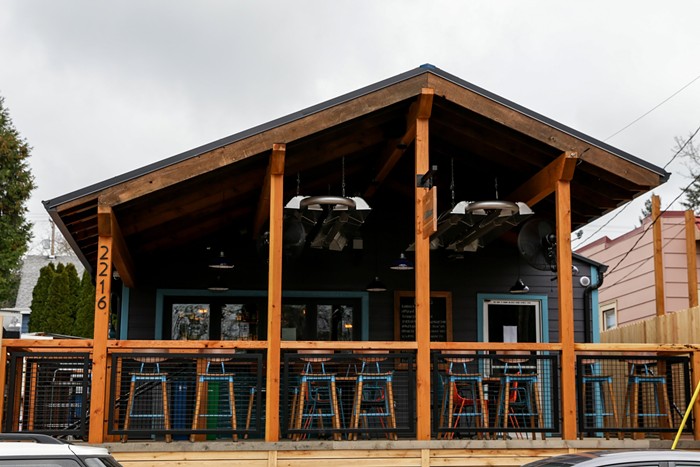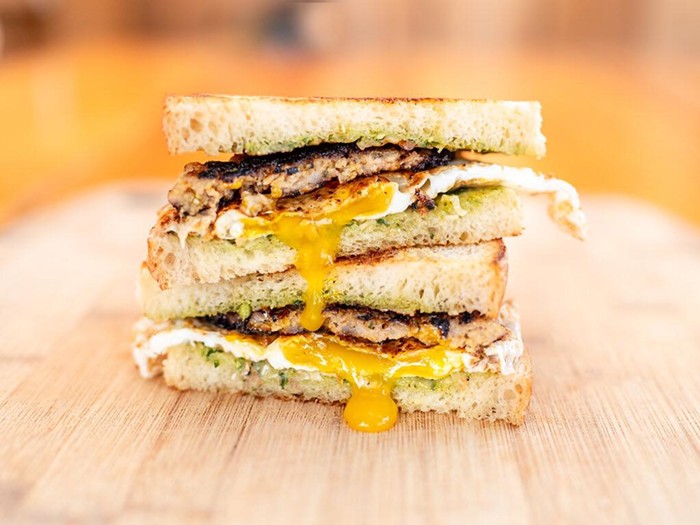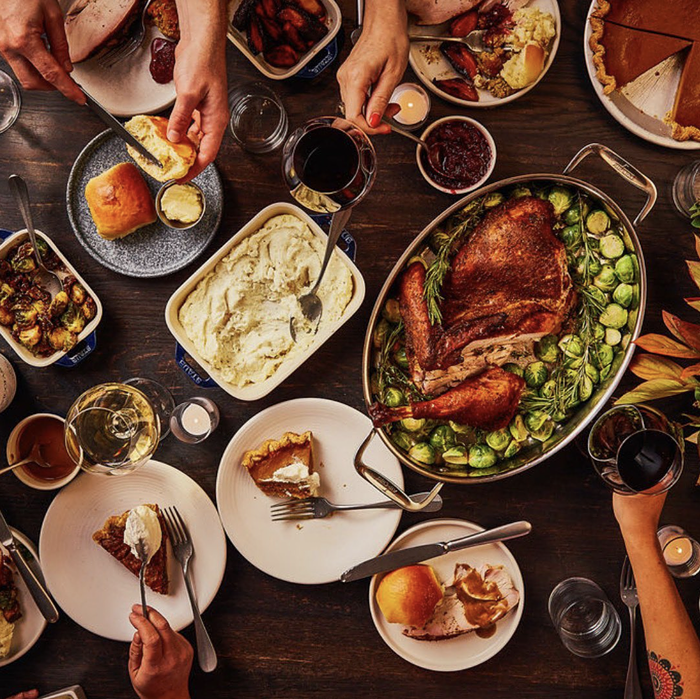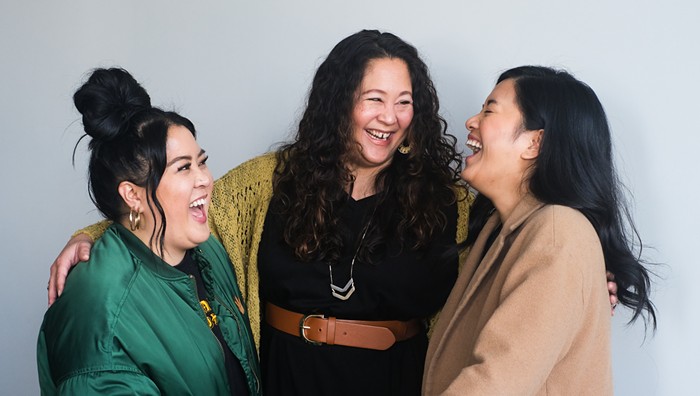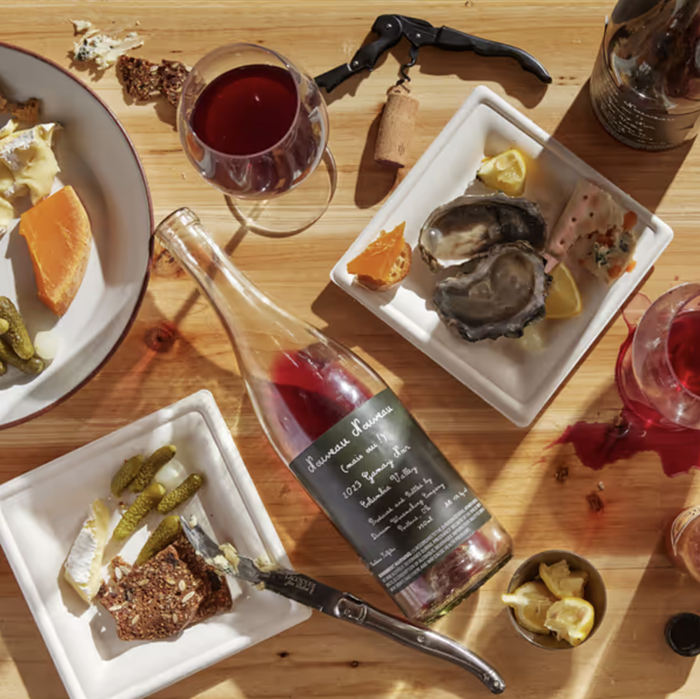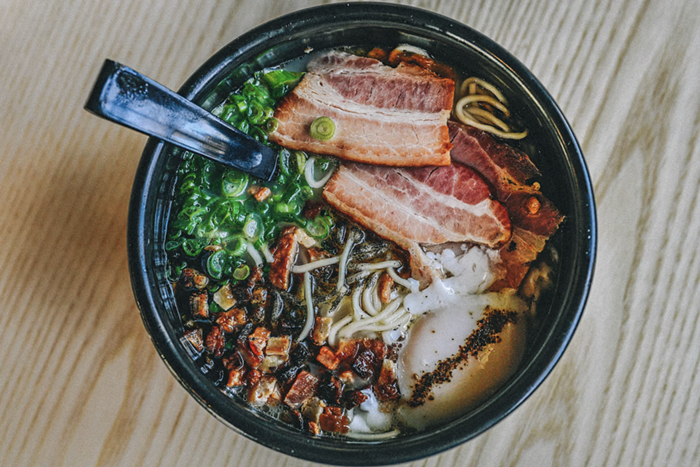
[UPDATE 8/2018: The name of Solid State has been changed to Wedgehead, due to another pinball bar called Solid State in Woodside, Queens, New York. No confirmed word on Wedgehead's opening date, although they hope to be open by the end of August. You can stay updated via their Facebook page and Instagram.]
Solid State, a pinball bar from Chris Rhodes and Alan Robertson, is slated to open this summer at 3728 NE Sandy. It’s taking over the space—which has previously housed the Blackbird music venue and Tony Starlight’s Supper Club—from punk bar the Know, which officially closed a few weeks ago. Rhodes is a local pinball operator who has machines all across Portland, and Robertson, an avowed pinball enthusiast who says Rhodes helped with his conversion, has accrued a wealth of kitchen experience at various spots around Portland, including several years as kitchen manager and chef at Bunk Bar.
Rhodes and Robertson have been talking about opening a pinball-centric bar for two or three years, and came very close to opening one in St. Johns at a former glass shop. A mandatory and very expensive sprinkler installation scotched the project, so they put their plans on hold. Meanwhile, the Know closed due to unfortunate circumstances that led to a rift between that bar’s owner, Ryan Stowe, and his employees, who collectively quit. Rhodes knew the space well, as he had set up a handful of his machines there (he also had games in the Know’s previous location on NE Alberta), so when the space became available, he and Robertson took the opportunity.
Rhodes and Robertson have signed a new, five-year lease with the landlord and have begun to prep the space for business, including replacing the ceiling, which had suffered water damage, uncovering the windows that cover the tip of the triangular building, and thorough cleaning. With all their paperwork filed with the city and the OLCC, they’re hoping to open as soon as the beginning of July, although they acknowledge the unforeseen delays in these types of ventures.
Solid State will have separate bar and pinball areas. They’re removing the Know's stage and putting 25 to 30 machines in the upper area, at the triangle’s tip. More conventional seating will be down below, next to the bar and kitchen. “With the whole arcade experience,” Rhodes says, “it’s not always a fun place to hang out once you’ve spent your quarters. We wanted a place where you can sit, hang out, eat, and drink—a place where you can hang out with your friends even if they don’t like pinball.”

They’re still figuring out the layout, among other things. "The main thing is keeping it comfortable,” Robertson adds. "Because you can jam a lot of games in, but if you create all these choke points with the angles, it’s not fun to play those games with a lot of people there."
"Since we’re redoing the windows, we don’t want to have machines backed up to the windows, so that’s creating a little bit of a problem,” says Rhodes. They’re removing the wood that’s covered those windows for years—including the neglected smaller panels at the top—and replacing the glass where it's broken, making it sound as though that corner of Sandy could look very different by the time Solid State opens its doors, although Rhodes and Robertson stress the importance of keeping the building’s historical charm preserved.
Rhodes and Robertson mention other pinball places that they love, including Pins and Needles in Los Angeles, Blairally in Eugene, Logan Arcade in Chicago, and Shorty’s at Seattle. They’re hoping to hold tournaments and league play, as well has have designated hours for minors, who get shut out from the pinball machines in 21-and-over bars. They’ll be keeping some of the existing murals from the Know and potentially adding to them, while the ceiling will be decorated with a huge amount of blown glasswork that a friend from Esque Studio is providing.
Robertson’s plans for food, meanwhile, will be typical bar fare done with precision and expertise. “I’m passionate about making good food, but I’m also passionate about making food that people want to eat on a regular basis,” he says. "I want this to be a place where you go regularly, after work or when you don’t really know what you’re going to do that night for dinner. Here you can get a good burger or sandwich—take the basics and over-engineer them to make them as good as possible. Within a bar framework, I think we can make comfort food and bar food that people will really like, and at a good price point.”
He adds that maybe at some point in the future, the menu might include arepas, or even fish tacos to reflect his San Diego upbringing. He and Rhodes also mention another long-term goal of opening in the mornings and potentially serving bagels and espresso; Rhodes mentions Tiny’s Coffee as a local place he loves to play, and says the morning, coffee-fueled pinball game is a rare pleasure that deserves to be more widespread.
Rhodes currently has more than 100 pinball machines, with around 50 on location (the rest are kept in his shop in Linnton). Even with Solid State’s 25 to 30 tables—which puts them just behind Ground Kontrol and Quarterworld in terms of number of machines—he’ll still going to keep his current business going, although he may need to take on some help to keep up with two full-time jobs. Rhodes' oldest game is Big Casino from 1962, and Solid State will be home to machines from all eras, including the newest releases. Rhodes and Robertson talk about Stern’s new Iron Maiden game—designed by pinball champ Keith Elwin—as an example of the types of great new games being made today.
"The coolest thing about pinball is that because of its size, it’s not replicated, really,” says Robertson. "You can’t play it on your phone. I’m sure everyone played the Microsoft pinball that came with their computer, but unlike other video games, you cannot replicate the physics of a pinball machine. Because of their size, their weight, and their expense, it’s really only feasible for the richest people to have a real collection in their house. It’s kind of like bowling—if you want to bowl, you have to go out, because it’s not feasible to have bowling in your house.”
"That was one of the reasons I started doing what I’m doing,” adds Rhodes. "All these collectors were snatching up all the games. It was like the dude who has 20 hot rods in his garage and never drives them. And it’s just like, fuck that! These games were meant to be played. They were meant to have coins jammed into the slot.”
